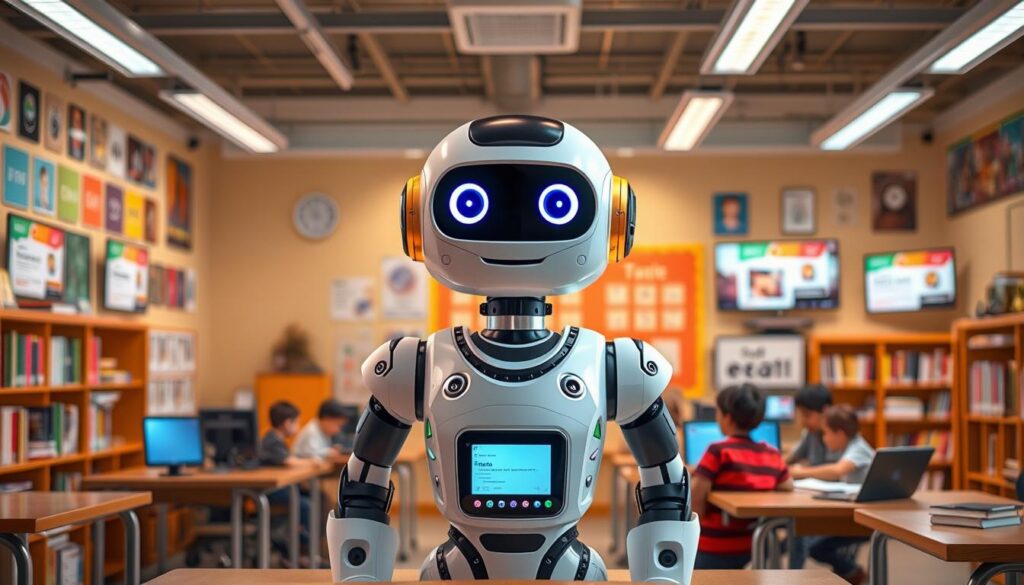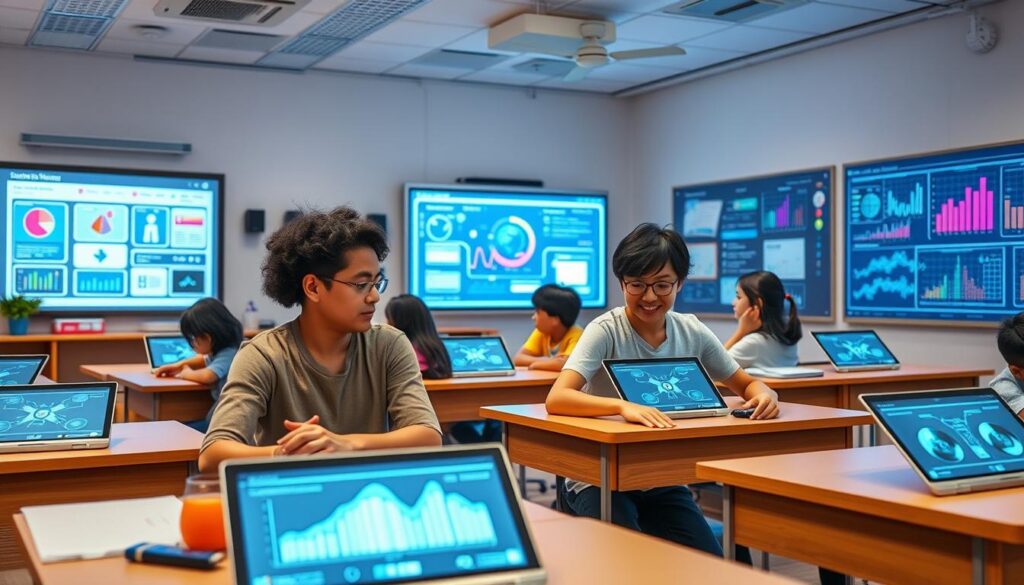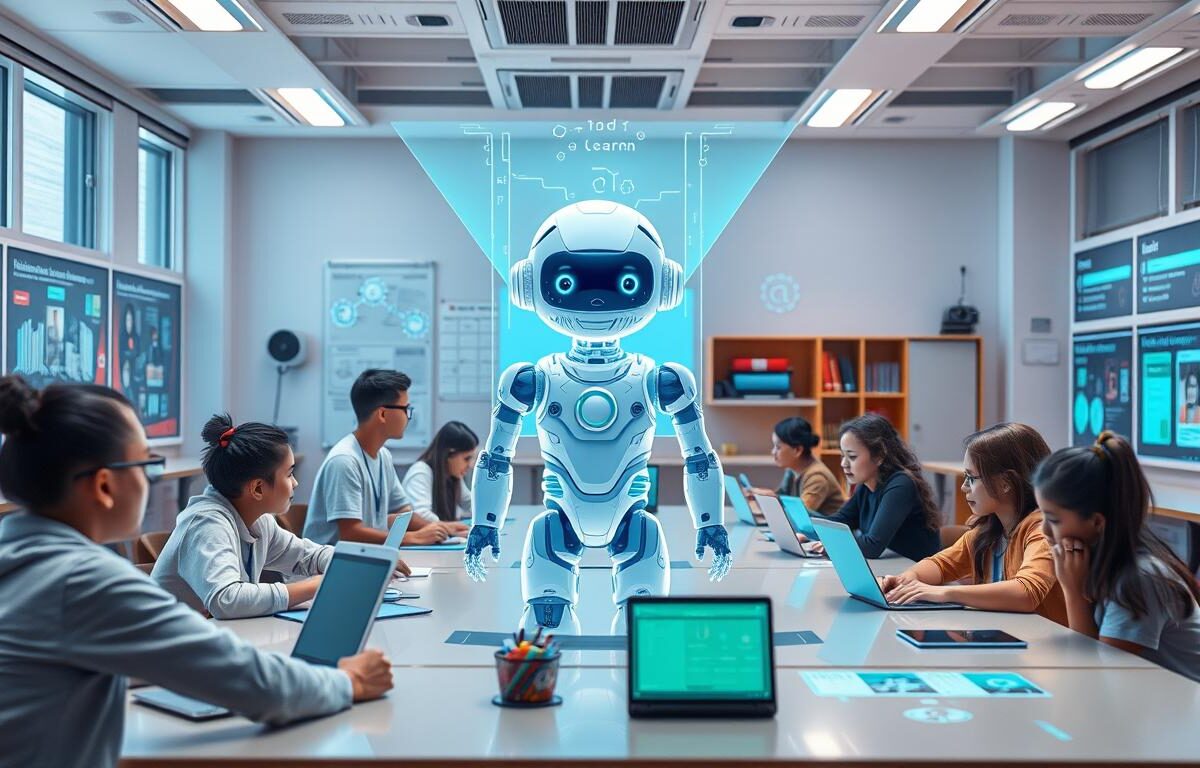The field of educational tech is changing fast because of AI agents. They offer many services like personalized tutoring and help anytime you need it. These agents use machine learning and AI to change the way students learn and interact with educational material. They adapt quickly to each student’s learning speed and what they like.
With conversational agents, students can better understand their lessons and feel more motivated. This makes learning more efficient and fun.
A 2014 study by Veletsianos and Russell showed that conversational agents help students understand more and stay interested. Also, a report in the Journal of Educational Psychology found that AI tools for personalized learning really boost grades. This is compared to the usual way of learning. These smart learning programs also work 24/7 and fit with any schedule. This means students can learn when it suits them best.
Key Takeaways
- AI agents are making big changes in educational tech with personalized help and 24/7 assistance.
- Veletsianos and Russell found that talking to AI agents makes students more engaged and helps them understand better.
- Using AI for personalized learning can really improve grades, says the Journal of Educational Psychology.
- AI tools in education support learning at your own pace. They can adapt to fit any study schedule.
- The market for AI in education is expected to grow from $1.1 billion to $6 billion by 2025. This is a growth rate of 45.12%.
Introduction to AI Agents in Education
Artificial intelligence, or AI, is changing the way we learn. It uses smart programs to help students in a personal way. AI agents act like virtual tutors, talking through text or voice. They make learning fun and efficient by providing customized help.
Research shows simulations are great for learning. They’re used by the military, doctors, drivers, and customer service teams. These simulations are carefully made by developers and experts.
Making these training tools used to take a lot of time, sometimes even years. They needed game designers, coders, and educational experts to build. Now, more than 100,000 students have used these tools. AI is now making it easier to create these educational simulations.
But, using AI in schools has its own challenges. There can be biases, technical issues, and ethical worries. It’s important to know what AI can and can’t do. AI agents range from simple chatbots to systems running whole courses. They help improve learning, cut costs, and make fewer mistakes.
AI agents can change K-12 education around the world. They offer new and exciting ways to learn. These virtual tutors also give personalized advice for careers and manage online courses.
| Aspect | Traditional Simulation | AI-Enhanced Simulation |
|---|---|---|
| Development Time | Months to Years | Weeks to Months |
| Resource Requirements | High | Moderate |
| Customization | Limited | High |
| Cost | Expensive | Cost-Effective |
With all the benefits, we still need to think about ethics and privacy. Teachers and school leaders must learn about digital skills, AI, and making choices based on data. The future of AI in education looks bright. It promises personalized advice for students and managing online classes in new ways.
Types of AI Agents in Educational Settings
In education today, AI agents play a big role. They help with learning by using different systems. Teachers use them to make learning better and to streamline how they teach.
Text-Based Chatbots
The most known AI agent is the text-based educational chatbot. These chatbots talk through text and answer students’ questions about their courses quickly. For instance, platforms like Jill Watson can answer thousands of student questions in online classes. These chatbots also make custom lesson plans for each student, improving the learning experience.

Voice-Based Virtual Assistants
Then, there are voice-based virtual assistants. They understand speech. This type supports smart tutoring systems and offers a talkative learning experience. They’re great for students who learn by listening and those working on language skills. These assistants explain complex topics and answer questions in a conversational manner.
Embodied AI Agents
Embodied AI agents make learning more hands-on. They can be animations or robots. These agents are great for showing how to do things, like in science experiments. Robots in a lab can show experiments in a way books can’t. They combine seeing and doing to help students apply what they learn in real life.
Using different AI agents in schools helps meet every student’s needs. It keeps learning going, even after class ends. Students get ongoing support and stay engaged.
Benefits of AI Agents in Education
The online education market is growing fast. It’s expected to reach about $166.60 billion by 2023. AI agents are playing a big role in making learning better. They offer many benefits to both students and teachers.
Personalized Learning Experiences
AI agents look at how students are doing to give them customized lessons and tips. This helps students learn better and grow personally. They get learning that fits their own styles and needs, making education more effective.
24/7 Learning Support
Digital learning tools are not limited by time. AI agents help students learn any time they want. This flexibility helps students fit learning into their busy lives. AI chatbots and helpers are there all the time, helping students keep growing.
Improved Student Engagement and Motivation
AI agents make learning more fun and interactive. They use games and activities to make learning more engaging. This helps students work together and solve problems. It changes learning from just watching to actively doing, which makes it better.
| Benefit | Description |
|---|---|
| Personalized Learning | Tailors educational content to individual needs, promoting effective learning. |
| 24/7 Support | Offers flexible, continuous learning assistance, adapting to varied schedules. |
| Engagement & Motivation | Uses gamification and interactive methodologies to maintain student interest. |
Adaptive learning software and digital tools with AI are changing education. They make learning personal, flexible, and more engaging.
AI Agent for Education: A Game Changer
AI agents are transforming education in a big way. They can change and give tailored feedback. This makes learning complex topics easier for students and teachers.
AI like Google’s Smart Compose, launched in 2018, shows us what’s possible. In 2021, Google brought out LaMDA, and in 2022, PaLM came along. By 2023, Google merged these into NotebookLM. Dr. Philippa Hardman found NotebookLM great for making study materials from conference talks. This shows its big role in using machine learning in education.

OpenAI’s ChatGPT 4o and o1 in 2024 are big steps forward for AI tools. NotebookLM’s Audio Overviews in September 2024 got people talking. Marc Watkins says NotebookLM is like a helpful research buddy. It makes learning from many sources easier.
Here’s a look at some standout AI tools and what they do:
| AI Tool | Year Launched | Key Features |
|---|---|---|
| Smart Compose | 2018 | Text generation abilities |
| LaMDA | 2021 | Enhanced language understanding |
| PaLM | 2022 | Advanced language models |
| NotebookLM | 2023 | Summarization and study material creation |
| ChatGPT 4o & o1 | 2024 | Advanced conversational abilities |
These tools help teachers automate boring tasks and spend more time on important things like critical thinking and talking with students. They show how machine learning in education changes the game, making AI a key part of modern learning.
Challenges and Considerations
Using AI in schools can be great, but it has challenges. We need to think about ethics, keeping data safe, and making it work with what we already have. These things are key to doing it right.
Ethical Implications
Putting AI into schools brings up big questions. Like, could teachers lose jobs? And, might AI systems be unfair? Making sure AI is used the right way is important. We want it to make learning better without making things unequal.
Data Privacy Concerns
AI systems gather a lot of info. This makes privacy very important. We must make sure data is kept safe and used properly. Keeping data secure helps everyone trust and respect schools more.
Integration with Existing Systems
Mixing AI with what schools already use isn’t easy. It takes smart planning and good tech. But, getting it right is important for success.
Even with these hurdles, AI could really change schools for the better. If we handle these issues well, AI can do a lot of good. For more on how AI can change business and more, check out this resource on AI and business.
| Aspect | Challenges | Considerations |
|---|---|---|
| Ethical Implications | Potential employment impact, bias reinforcement | Promote equitable AI practices |
| Data Privacy Concerns | Handling massive data volumes | Implement robust data protection mechanisms |
| Integration with Existing Systems | Technical and logistical difficulties | Develop integrated solutions |
Conclusion
Throughout this article, we’ve seen how AI agents are changing education for the better. They make learning personal and accessible to everyone. AI leads the change in education by linking old methods with new tech. Text chatbots, voice assistants, and smart AI agents set a new bar for learning.
The perks of AI in education include constant learning support, 24/7, tailor-made lessons, and sky-high student involvement. Looking ahead, AI might even create content and translate languages instantly. But, we can’t ignore the ethical, privacy, and tech challenges that come with AI.
Schools, tech firms, and policy makers need to work together. This way, they can make the most of AI’s power and avoid its pitfalls. Investing in better AI tools and training for teachers is key. This will keep online learning top-notch. AI’s growth reminds us it’s time to rethink how we educate, improving it worldwide.
FAQ
What is an AI agent in education?
An AI agent in education helps enhance learning with its smart features. It uses adaptable technology to improve interaction. These systems can interact through text or voice. They offer customized educational materials and support to students.
How do text-based chatbots work in educational settings?
Text-based chatbots assist students by providing instant replies. They answer questions about coursework and study materials. This makes them a great help outside regular classroom times.
What are voice-based virtual assistants?
Voice-based virtual assistants help by using speech to communicate. They support learning through listening and speaking. This is great for practicing languages and conversational learning.
What are embodied AI agents?
Embodied AI agents have a visual and sometimes physical form. They can be animations or robots. They make learning more engaging with demos or simulations.
How do AI agents promote personalized learning experiences?
AI agents personalize learning by analyzing each student’s performance. They adapt educational content to fit each student. This makes learning more effective and helps personal growth.
What benefits do 24/7 learning support AI agents provide?
AI agents are available any time for learning support. They fit different student schedules and lifestyles. This flexibility helps students manage their learning better.
How do AI agents improve student engagement and motivation?
AI agents use games and responsive interactions to make learning fun. They keep students motivated and engaged. This is done by delivering content in interactive and dynamic ways.
What ethical implications are associated with AI in education?
Using AI in education leads to questions about jobs for teachers. It also raises concerns about AI reinforcing biases in education.
What are the data privacy concerns with AI agents?
The use of AI agents means a lot of student data is collected. There are big worries about how this data is handled and kept safe.
How can AI technologies be integrated with existing educational systems?
Adding AI technologies to current educational methods can be challenging. It needs careful planning to work well without issues.



